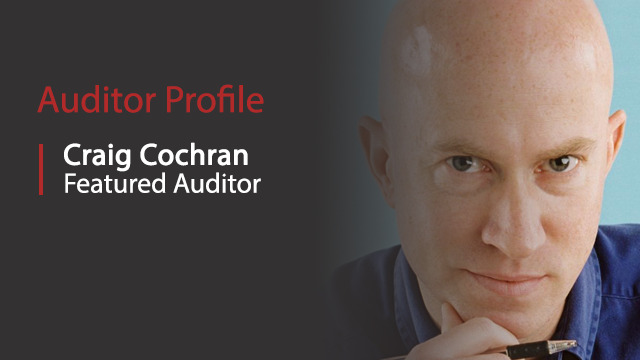Propelled by 30 years of audit experience, Craig Cochran channels his vast knowledge to author quality publications and teach others the fundamentals of auditing excellence.
In his current role as project manager with Georgia Manufacturing Extension Partnership at Georgia Tech, Cochran spends his time auditing, offering implementation assistance, and providing course instruction.
Here, Cochran reflects on his auditing career, publishing achievements, and offers some terrific advice and thoughts on how to improve the standard of auditing.
How did you get into auditing?
I began auditing officially around 1989 when the company I worked for implemented ISO 9002:1987. I led the implementation process at a number company locations and also developed the audit process. Prior to this, I also did something similar to auditing. I was routinely told to “go check on things in production.” This was not labeled as auditing, but essentially that’s what it was.
What is your history in the profession?
My first quality assurance job was with PacTell Cellular in 1987. I was responsible for the quality of cellular phone service in the Atlanta calling area and assisting users to correctly using their equipment. Cellular phone service was very expensive at this time and it was considered a very exclusive thing. This is where I first learned the power of written procedures and the significance of feedback coming directly from customers. As I began creating written procedures for various tasks, it became clear that some sort of follow up was needed to make sure we were implementing the procedures. This was the genesis of auditing in my career.
Why did you want to become an auditor?
I never wanted to become an auditor. It simply happened. Process discipline created the need for verifying that we were “walking the talk.” These early audits were not even called audits and were not the least bit formal. My experiences with these quasi-audits led to me developing a very relaxed, friendly style during audits. To this day, I still have a very relaxed approach. It helps to keep a warm and cooperative environment and everyone involved tends to enjoy the process.
What are some highlights of your career?
Every day has been a highlight. That sounds silly, but the truth is that I try to learn something new every day, and I usually succeed. Any day that you can expand your skills and knowledge is a huge success. Auditing is a great opportunity for learning. If an auditor can tell himself, “Today I’m going to learn some incredible things from the people I’m auditing,” he will be in a cooperative and flexible state of mind. He’ll be a good listener and genuinely interested in everyone he speaks to. In short—a fantastic auditor.
Please tell us about your writing/publishing experience.
I had the good fortune of writing for Quality Digest and a handful of other quality publications. This led to my first book, Customer Satisfaction: Tools, Techniques, and Formulas for Success, in 2003. Since then I’ve written eight books on various quality topics. My book ISO 9001:2015 in Plain English is the leading book on ISO 9001 in the world. My hopes are that my most recent book, Internal Auditing in Plain English, takes off and also achieves the same prominence. I can honestly say that Internal Auditing in Plain English is the culmination of 30 years of experience in auditing.
What do you like the most about being an auditor?
I like learning from people and giving employees the opportunity to demonstrate their vast knowledge and skills. I’m naturally curious and it’s fascinating to have a new process explained to me. If there’s a flaw in the process, then it becomes an opportunity. I really enjoy making positives a centerpiece of my audit reports. Make no mistake, though, if there are nonconformities they will be written and written accurately.
What is the most challenging part of being an auditor?
The most challenging thing is maintaining a state of mental focus for multiple hours. It can be exhausting. Being physically fit is the best way to enable the needed level of focus, in my opinion.
What are your tips for auditors to improve the standard of their auditing?
Treat the audit as a friendly conversation with fascinating people. Go into the audit with this mindset and you will naturally produce excellent results. Put yourself in a learning frame of mind before every single audit. Another tip would be to observe as many other auditors as possible. Some of these auditors will be examples of what NOT to do, which is still valuable. Get as much experience as possible, but never let the experience blind you to what the audit is at its core—a friendly conversation about how the organization tries to be successful.
What will auditors be focusing on in 10 years?
More and more production will be achieved through automation and robotics, so audits will focus on what it takes to make these processes work properly—the correct machine programming, set-up, preventive maintenance, etc. Ultimately, it is people who do these things. No matter how technological our work becomes, it still boils down to human activity. Auditing will always be a friendly conversation and an opportunity to learn.

